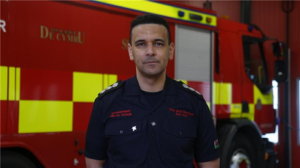“Lucy Letby effect” sees record numbers of midwives seeking lifeline support from mental health charity

Record numbers of midwives are contacting a charity for mental health support, new figures reveal.
The Laura Hyde Foundation says they received 3,074 calls last year – up 119 percent on 2022 when there were 1,402.
The charity, which provides support to all emergency service workers, said they felt the Lucy Letby case was behind the rise in requests for help.
Liam Barnes, the chairman of the Laura Hyde Foundation, said: “Requests for our support have risen dramatically across all sectors – but the rise is especially stark among midwives. In fact we are supporting the largest number of midwives in our history right now.
“There are likely to be many reasons for this, including the Lucy Letby case. As a charity we are concerned the Letby trial tarred many excellent midwives with the same brush and has sadly led to many midwives finding themselves being suspected of negligible and criminal behaviour, often without any evidence. Understandably, this often causes significant distress to the individual, their colleagues and their family. Our services are needed more than ever and we need more funding and support from the government to deliver the right interventions.”
The trauma many midwives are facing is just the tip of the iceberg, according to the charity. New data shows they were contacted on 11,119 occasions in 2023 by emergency service workers.
This is up from 7,288 in 2022 and 5,422 in 2021 – meaning the demand for the charity’s services have increased by 205% in the space of two years.
Alarmingly, more than half of those who contacted the LHF last year – 5,815 – said they had either suffered suicidal thoughts or undertaken suicidal activity.
Those aged 28-37 were the most likely to reach out for help – 3,310 in that age group contacted the LHF last year.
e reasons emergency service workers got in touch included issues relating to workplace bullying, racism, workload, financial worries, anxiety and sexual abuse.
Mr Barnes added: “2023 saw a record number of emergency service workers reaching out to the Laura Hyde Foundation for support with many showing signs of suicidal ideation.
“We are seeing a swell of people struggling to deal with a number of items such as cost of living crisis, a post covid grieving process as well as abhorrent abuse aimed at them from the public or indeed their own management.
“Our emergency services workers are people that often do the work for the simple love of helping people, a cornerstone of our NHS. Given their relatively low pay and long working hours, it is their unwavering desire to try and help people that gives them their job satisfaction and then that is questioned, it often has dire consequences.
ther data released by the LHF shows nurses contacted the LHF in the greatest number. In 2023 the LHF was contacted by 3,334 nurses. They were contacted 3,074 times by midwives, 2,278 by medical students, 966 times by doctors; 769 times by those working in social care; 339 times by GPs; 281 times by paramedics; 59 times by police officers and 19 by firefighters.
In 2022 the figures were: 2022 Breakdown by top-level job category – Nurse (2,176), Doctor (742), Midwife (1,402), GP (462), Medical Student (1,324), Paramedic (652), Social Care (328), Police (184), Fire (18)
The LHF say the reasons why they were contacted can be broken down as follows:
Workplace bullying (443), Issues relating to patient Care/Grief (886), Impact on Family (376), Workplace Racism (168), Workload (849), Anxiety of making a mistake (442), Cost of Living/Financial (661), Body Image (119), Food Anxiety (65), Sexual Abuse (343), Exam Pressures (409), Phobias (38), Did not want to disclose (5,316), Other (1,004)
One midwife told the LHF morale at her NHS hospital was at rock bottom.
The lady, who works at a hospital in the north-east of England, said: “The Lucy Letby case cast a black cloud over the entire midwifery service, so I am not surprised to see that many colleagues are struggling and feeling on the end of a backlash.
“The reality is the majority of midwives in the NHS are incredibly hard-working and we sweat blood and tears for our patients and their babies.
“But all too often we are facing an uphill battle because services are so stretched which can have a knock on effect on morale. In some hospitals where friends of mine work it’s been at rock bottom for a while now.”
Commenting on the report, Gemma Clay, 39, a nurse and clinical doctorate fellow at the University Hospitals Sussex NHS Foundation Trust, added: “The statistics do not surprise me as I have witnessed many conversations with healthcare staff saying they are exhausted. There are many reports of bullying in the workplaces which organisations need to be addressing especially in the NHS. It’s shocking how many are impacted by workplace bullying. I have seen an increase in nursing staff looking at taking early retirement or some leaving nursing altogether due to the impact work is having on their mental health.”





